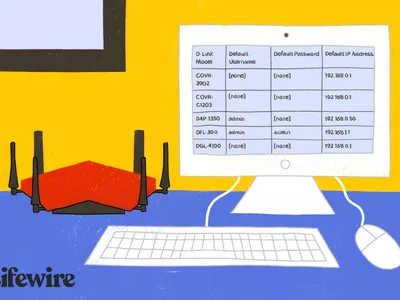
The Best 8 VPN Hardware Devices Reviewed On Oppo Find X6 Pro | Dr.fone

The Best 8 VPN Hardware Devices Reviewed On Oppo Find X6 Pro
In today’s world, it is highly recommended to use a VPN while using the internet. Although it helps us access geo-restricted content, it can also strengthen our security. Besides using a VPN software, you can also use a VPN hardware as well. For instance, a hardware VPN for home use can be connected to your network and let all the Oppo Find X6 Pro devices enjoy its benefit. To help you pick an ideal hardware VPN, we have come up with this guide. In this post, we have compared various Amazon hardware VPN options and have handpicked the top 8 of them for you.
If you want to use a hardware VPN for your home or business needs, then you can certainly meet your requirements with these options.
1. Cisco Systems Gigabit Dual WAN VPN
If you have already used Cisco products in the past, then you won’t face any trouble using this Amazon hardware VPN as well. It provides a wired connection with its 14 different LAN ports.
- Load balancing is supported by its dual gigabit Ethernet WAN ports
- Has an inbuilt SSL (Secure Socket Layer) and SPI (Stateful Packet Inspection) firewall.
- It is quite easy to perform its setup, as it comes with an intuitive GUI setup wizard.
- You can analyze employee productivity as it can manage different users at once.
- It is an advanced IP Security VPN hardware.
- The data transfer rate is 100 Mbps
- Warranty: 90 days
Price: $172

2. Zyxel Next Generation VPN Firewall
This VPN hardware by Zyxel will help you meet your business needs for sure. It is one of the most secure devices that you can try to get an access to around 100 VPNs.
- The hardware VPN supports up to 60 thousand sessions at the same time
- Provides an SHA-3 encryption
- It supports a speed of 300 Mbps VPN and 1 Gbps firewall
- Provides a dual-WAN fallback and failover support
- Besides IPSec, it includes SSL tunnels as well (IPv6 is also supported)
- Layer 2 Tunneling Protocol for mobiles (Android, iOS, and Windows phones)
- Warranty: 2 years
Price: $450 (for 100 VPNs), $950 (for 300 VPNs), and $1350 (for 1000 VPNs)

company, user or members of the same household. Action! - screen and game recorder</a>
3. GL.iNet GL-AR150 Mini Travel Router & VPN
If you are looking for an affordable hardware VPN for home use, then you should check this portable VPN router by GL.iNet. Since it is lightweight and portable, you can carry it anywhere and use it as per your needs.
- It has an inbuilt OpenVPN and TOR client.
- This mini router provides an access to over 20 different VPN services.
- You can either use its adapter or any laptop/power bank to use it.
- Weight: 1.41 oz
- Dual Ethernet ports
- 64 MB RAM and 16 MB flash ROM
Price: $22
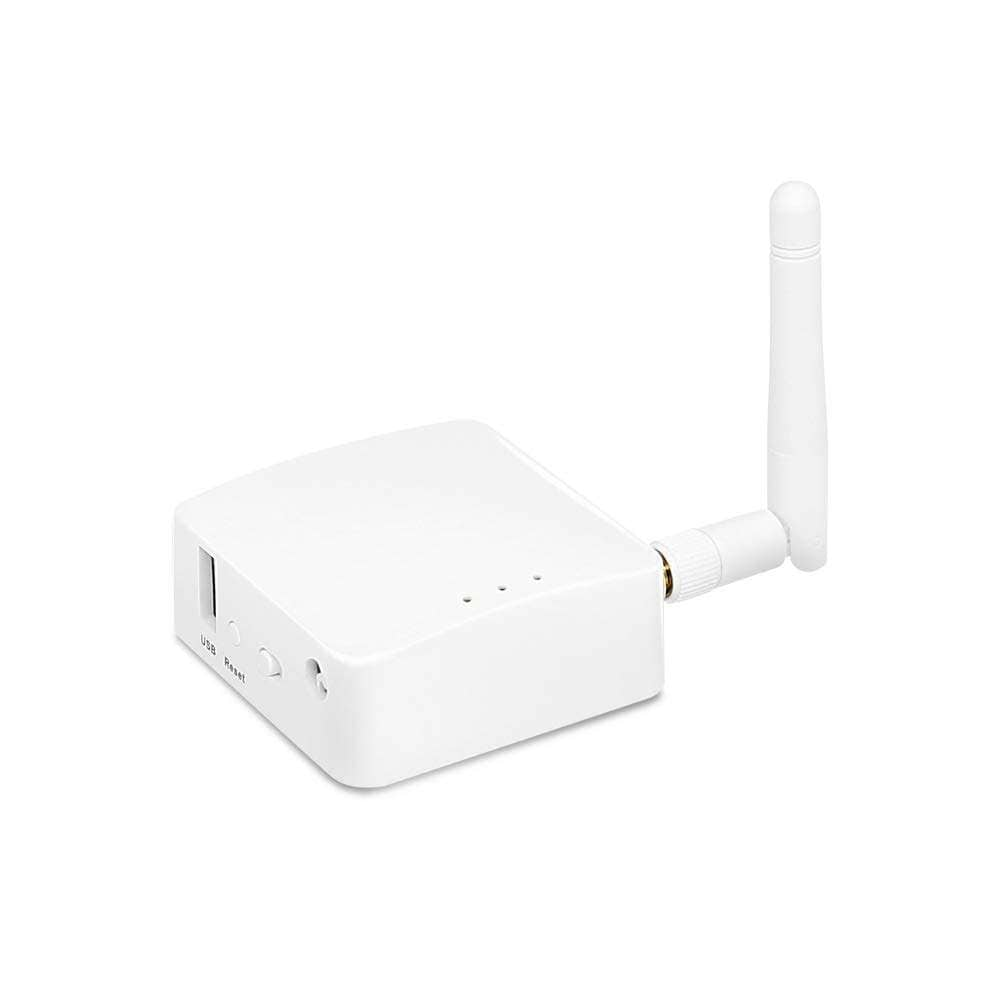
4. UTT HiPER 518 VPN
It doesn’t matter if you like to use VPN for your home network or small business, this Amazon hardware VPN will come handy to you on numerous occasions. It comes with a quick setup wizard as well to assist you.
- The hardware VPN supports real-time backup
- Inbuilt load balancing feature
- Several advanced features like native firewall, access control, IP binding, NAT, and more
- 5 VPN tunnels can be used
- Has an auto negotiation and auto MDIX property
- It has 2 10/100M WAN ports and 10/100 LAN ports
- Ethernet connectivity with 100 Mbps data transfer rate
- Warranty: 1 year
Price: $40

5. Dell Sonicwall TZ300 VPN
Another secure Amazon hardware VPN that you can try is from the house of Dell. Even though it is a high-performance router, you might need to walk an extra mile to setup its VPN compared to other products.
- The VPN hardware is optimized for Windows, Mac, and Android users
- It has an inbuilt SSL encryption.
- Comes with an anti-virus, anti-spyware, and intrusion prevention technology
- Supports IPSec and USB connectivity
Price: $554

6. Linksys Business Dual WAN VPN Router
This hardware VPN router by Linksys is majorly designed for small and medium-sized offices. This site-to-site VPN supports Ethernet connectivity and has a remarkable data transfer rate of 1000 Mbps.
- It provides 110 Mbps IPSec and 900 Mbps firewall
- There are 5 OpenVPN tunnels dedicated to iOS and Android devices
- Besides that, it has 50 site-to-site IPSec tunnels
- Inbuilt features like WAN failover and load balancing
Price: $165
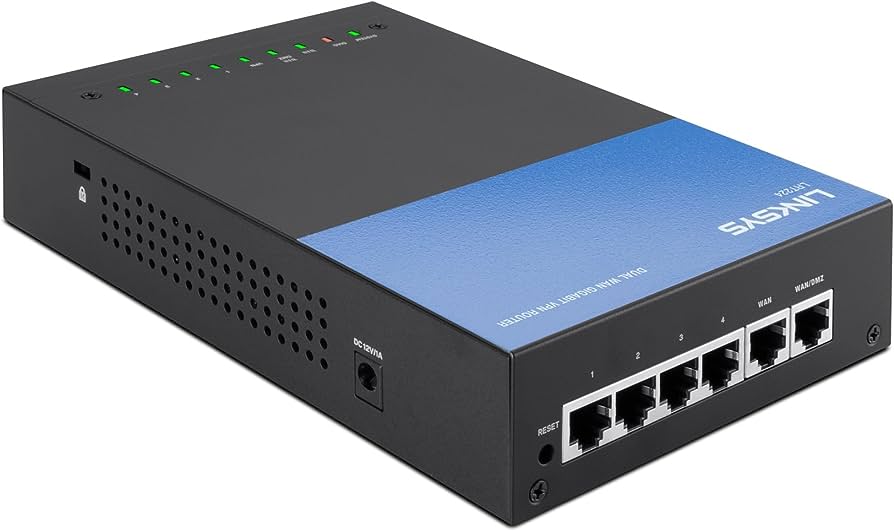
7. D-link 8-port Gigabit VPN Router
This router by D-link is an ideal pick for hardware VPN for home use and small offices. It supports Green Ethernet to optimize its power needs as well.
- VPN tunnel integration – 25 IPSec and 25 PPTP/L2TP tunnels
- It has 8 LAN (Gigabit) ports and 1 WAN (Gigabit) port
- Additionally, it has 5 SSL tunnels and 10 GRE tunnels
- Easy to configure, the VPN firewall comes with its GUI interface
- Administrations can also block websites with its dynamic web content filtering feature
- Limited lifetime warranty
Price: $130
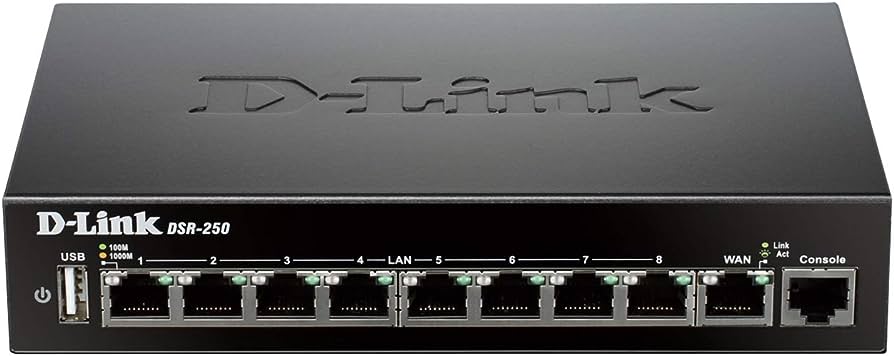8. TP-Link SafeStream VPN Router
This Amazon hardware VPN by TP-Link is one of the most popular Gigabit VPN routers out there. It comes in numerous versions as well and can be upgraded as per your requirements for a hardware VPN for home use.
- Supports 20 IPSec and 16 PPTP VPN tunnels
- Also has 4 Gigabit LAN and 1 Gigabit WAN port for high connectivity
- Advanced encryption techniques including AES128, AES192, AES256, DES, and 3DES with MD5 and SHA1 Authentication
- Also provides Manual and IKE Key Management
- DoS defense protection (with SPI firewall)
- Warranty: 1 year
Price: $57

Alternative: Set Up VPN on Common Hardware Devices
With any of the above VPN hardware devices, you can set up reliable VPN services in your home or office.
But many of them come with a high price, and may prove to be expensive for some individual users.
So, for a common PC, phone, router, Android TV, etc., how to set up VPN in a more affordable manner?
Many users choose NordVPN to do it for the following reasons:
- Supports 6 devices at the same time.
- VPN service can be set up on Windows, Mac, Android, iOS, Linux, and a wide range of routers.
- 24 / 7 customer service available.
- VPN service provider for large companies like CNN and BuzzFeed.
- As low as roughly 3 USD per month.
Now when you know about the various options for hardware VPN for home use and business purposes, you can easily pick a VPN hardware of your choice. We have listed different kinds of options in this post, helping you make up your mind. You can always visit their Amazon page and get more information about them. Go ahead and pick the hardware VPN of your choice and let us know about it as well.
Dr.Fone - Virtual Location
1-Click Location Changer for both iOS and Android
- Teleport from one location to another across the world from the comfort of your home.
- With just a few selections on your computer, you can make members of your circle believe you’re anywhere you want.
- Stimulate and imitate movement and set the speed and stops you take along the way.
- Compatible with both iOS and Android systems.
- Work with location-based apps, like Pokemon Go , Snapchat , Instagram , Facebook , etc.
3981454 people have downloaded it
A Detailed Guide on Faking Your Location in Mozilla Firefox On Oppo Find X6 Pro
Mozilla Firefox is one of the most famous browsers known for its security. Like other browsers, it also tracks your location and shares it with websites. Although Firefox asks for your permission before sharing your location, it can still be a privacy concern for many people. For many reasons, disabling your location is disadvantageous, so Firefox spoof location can resolve your concerns.
It is not hard to change or spoof your location in Mozilla Firefox. Stick with this article to learn different ways to fake a location in Firefox on devices.

Part 1: Preparations Before Spoofing Your Location in Firefox
Before starting with Firefox location spoof, you must be aware of how the platform and websites determine your location. There are many ways a browser can detect your location. It includes services like IP addresses, GPS tracking, Wi-Fi, and Bluetooth. The main tool browsers and websites use to determine your location is HTML5 Geolocation API.
1. Basic Understanding of the HTML5 Geolocation API
Basically, a browser API called HTML5 Geolocation API is used by websites and browsers to detect a user’s location using longitude and latitude coordinates. It is strictly based on user permissions for detecting location. That means you will receive a permission prompt whenever a website or browser uses it to detect your location. If you refuse the permission, they can’t use this API for location determination.
2. How Does HTML5 Geolocation Work?
HTML5 Geolocation determines your location using the longitude and latitude coordinates with the help of GPS. If your device doesn’t have GPS tracking, it uses Wi-Fi and cell tower signals to detect the Oppo Find X6 Pro device’s location. The location detected by HTML5 Geolocation is highly accurate with accuracy up to street level. Due to its high precision in locating users, it can create privacy issues for users.
Part 2: How to Fake Your Location in Mozilla Firefox on Computers
Many ways are available for you to fake or disable your desktop location in Mozilla Firefox to address your privacy concerns. You can either disable or change the location in the browser or use a third-party app or extension. Below, we have explained the three most common ways to fake or disable your location in Firefox.
Method 1: Disable Geolocation in Firefox
If you want to stop websites from accessing your location from Mozilla Firefox, you can disable the geolocation feature using Firefox Settings. The process to disable your location in Mozilla Firefox is covered using these steps:
Step 1: Open Mozilla Firefox on your computer to disable its location. Click the “Three Vertical Bars” icon to select “Settings.” Now, tap “Privacy & Security” from the left sidebar and navigate to “Permissions.”

Step 2: Click “Settings” in front of “Location” to manage the location settings. It will open a window with a list of all the websites that can access your location. Depending on your needs, you can choose between “Remove Web Site” or “Remove All Web Sites” to remove their location access.

Step 3: If you want to block the websites from accessing your location indefinitely, you can select the “Block new requests asking to access your location” option. Once selected, click “Save Changes” to disable your geolocation on Firefox.

Method 2: Manually Change Your Firefox Location
Disabling your location on Mozilla Firefox can stop websites from accessing your location. It also means websites with location-based services will no longer work. That’s why it is better to spoof the location on Firefox rather than disabling it. Firefox allows you to manually change your location using its advanced settings. The steps required for this process are given below:
Step 1: Once Mozilla Firefox is open, type “about:config” and press Enter. You will see a warning screen as you modify advanced settings. You have to click on the “Accept the Risk and Continue” button to proceed further.

Step 2: First search for “Geo.enabled,” and when it appears, toggle its value from “True” to “False” to disable geolocation. To spoof your location, search for “geo.provider.network.url” and press the “Pen” icon to edit it.
 SwifDoo PDF Perpetual (1 PC) Free upgrade. No monthly fees ever.
SwifDoo PDF Perpetual (1 PC) Free upgrade. No monthly fees ever.

Step 3: You can enter your desired location using its latitude and longitude coordinates. The format to enter your location coordinates should be:
“data:application/json,{“location”: {“lat”: LATITUDE VALUE, “lng”: LONGITUDE VALUE}, “accuracy”: 27000.0}.”
Once done, your geolocation will be changed to your desired location.

Method 3: Use The Location Guard Firefox Extension
Another way you can protect your location from websites is to use the “Location Guard “ add-on in Mozilla Firefox. It is generally recognized as an extension, also available in the Add-Ons Store of Firefox. The steps to add “Location Guard” and use it to alter your location are following:
Step 1: Click on the “Three Vertical Bars” icon from the top left corner of your Firefox and select “Add-ons and themes.” Tap “Extensions” from the left sidebar and search for “Location Guard” in the Add-Ons Store. Once located, click “Add to Firefox” to add it to your browser.

Step 2: You can choose between two options to protect your location’s privacy. Using the “Privacy Levels” option, you can select a privacy level and location range to add noise when a website tries to locate you. It stops websites from detecting your accurate location, though they can still locate the general area.

Step 3: Using its “Fixed Location” feature from the left sidebar, you can change your location. Here, select any location from the map by placing the “Marker” on it to change your browser’s location.

Part 3: How to Fake Your Location in Mozilla Firefox on Phones
It is not only on computers where you can use Firefox fake location but also on smartphones. You can easily disable or change your Firefox location on your iOS or Android device. Three different methods to disable or change the location in Mozilla Firefox are summarized below:
Method 1: Disable Geolocation Sharing on the Firefox Browser
If you use the Firefox browser on your phone, it allows you to disable your location using a couple of simple steps. Disabling location services for the Firefox browser differs on Android and iOS devices. A detailed step-by-step process for disabling location is given below for both platforms:
On Android
Step 1: Open the Firefox browser on your phone and press the “Three Dots” icon from the bottom right corner. Select “Settings” from the menu and navigate to the “Privacy and Security” section.
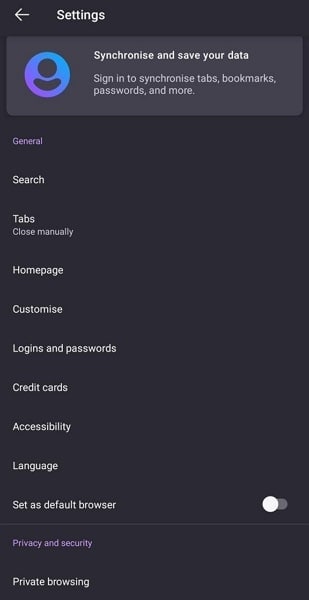
Step 2: Now, tap “Site Permissions” and select “Location.” In the “Location” option, select “Blocked” to disable the location access on the Firefox browser.

On iPhone
Step 1: On your iPhone, open “Settings” and scroll down to “Firefox.” After locating the app, select it and press “Location” on the next screen.

Step 2: In the “Location” menu, you can select “Never” to completely disable the location access for the Firefox browser. To only stop Firefox from detecting your accurate location, turn off the toggle of the “Precise Location” option.

Method 2: Spoof Your Location in Firefox Using Dr.Fone - Virtual Location
Nowadays, many websites work with the help of location-based services. Disabling geolocation from the Firefox browser means they won’t work. It means you need a tool that can change your Firefox location without affecting your favorite platforms.
Wondershare Dr.Fone - Virtual Location provides you with an excellent way to do Firefox location spoofing. You will not have to worry about websites or apps detecting your location as fake when using this tool.
Dr.Fone - Virtual Location
1-Click Location Changer for both iOS and Android
- Teleport from one location to another across the world from the comfort of your home.
- With just a few selections on your computer, you can make members of your circle believe you’re anywhere you want.
- Stimulate and imitate movement and set the speed and stops you take along the way.
- Compatible with both iOS and Android systems.
- Work with location-based apps, like Pokemon Go , Snapchat , Instagram , Facebook , etc.
3981454 people have downloaded it
Main Features of Dr.Fone - Virtual Location
- Dr.Fone - Virtual Location allows you to play location-based games. It includes games like Pokémon Go, Minecraft Earth, and Jurassic World Alive, all from the comfort of your bed.
- If you use a dating app like Tinder or Bumble, you can increase your likes and matches using this tool.
- You can bypass the geo-restriction of apps and enjoy their content with the tool’s help.
Steps Required for Spoofing Location in Firefox via Dr.Fone - Virtual Location
Using Dr.Fone- Virtual Location to spoof your location in Mozilla Firefox is simple and quick. You will need to install Dr.Fone on your computer and follow these steps for location spoofing:
Step 1: Install Dr.Fone on Your System
Download and install Dr.Fone on your computer and connect your phone to it. Access Dr.Fone, select “Virtual Location,” and click “Get Started” on the next screen to begin the process.

Step 2: Activate the Teleport Mode on Dr.Fone
After clicking “Get Started, “ a map will open where you must select your original location. It can be done using the “Center On” icon from the right sidebar. To choose your fake location, you will need to activate “Teleport Mode” from the top right corner.
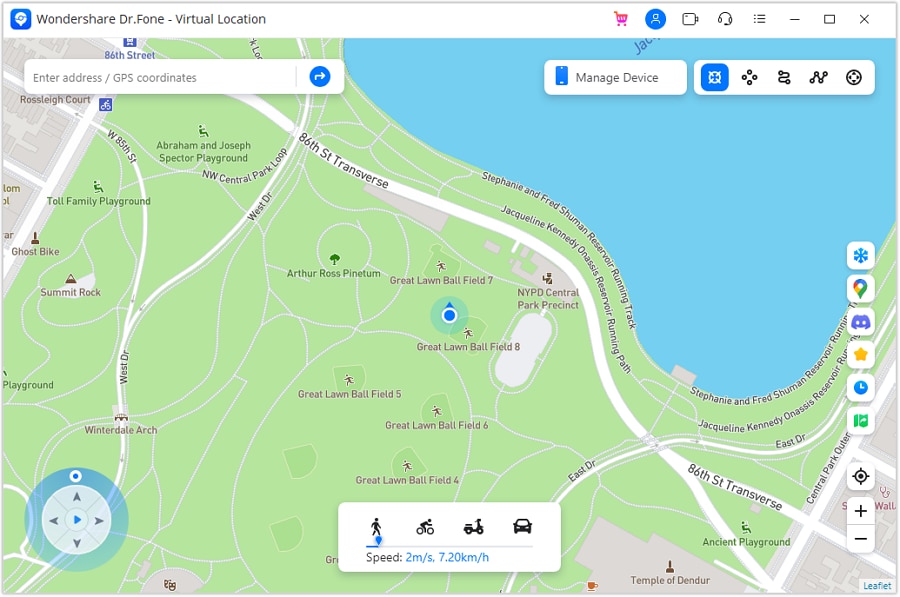
Step 3: Spoof Your Location in Firefox
Enter your desired fake location in the provided space and press “Go” once the mode is activated. It will take you to the entered location, where you need to select “Move Here” to complete the process. You can confirm the location spoof by opening any location-based app on your phone.
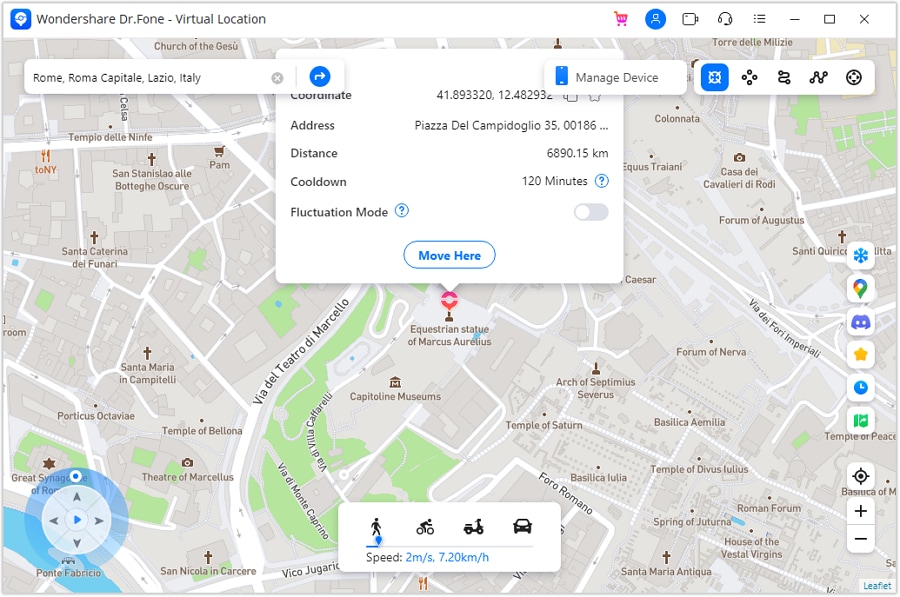
Method 3: Change Your Location in Firefox Using ExpressVPN
Browsers like Mozilla Firefox tracks your location by using your IP address. You can use a VPN to spoof your IP location to protect your actual location from websites. ExpressVPN is a VPN that is available for both Android and iOS devices. You can use these steps to change your location using ExpressVPN:
Step 1: Install ExpressVPN on your phone and create an account for it. If you are already a user of ExpressVPN, then log in with your account.
Step 2: Select your desired fake location from the “Smart Location” tab after logging in. Once a location is selected, press “Connect” to change to the desired fake location.

Conclusion
In today’s digital world, you have to compromise your privacy to some extent. However, it doesn’t mean that you should not try to use tools available to you to protect your privacy to the limit. Dr.Fone - Virtual Location solves your concerns regarding location sharing with ease. With this tool, you can fake location in Firefox and still enjoy all the features and services offered by location-based websites and apps.
How To Simulate GPS Movement With Location Spoofer On Oppo Find X6 Pro?
When you are playing location-based games like Pokemon Go, you might need to simulate GPS movement to catch more Pokemon. To do this, you can use the GPS movement feature of Wondershare Dr.Fone - Virtual Location . This feature allows you to simulate GPS movement between two or multiple spots on the map. Here’s how you can do it:
Part 1: Simulate Movement Along a Route (One-Stop Route)
You can set up a one-stop route when mocking locations fake with Dr.Fone - Virtual Location. This particular feature helps users to set up looping or round trips within a specific location. To perform the steps for simulating movement, look ahead for a better understanding:
Step 1Access One-Stop Route Function
Once you launch Wondershare Dr.Fone - Virtual Location and connect your smartphone successfully, proceed to select the One-Stop Route function from the top-right section. The function is represented by the third icon from the left in the section. While you have already teleported to another location or are using your current location, you can tap anywhere on the map to set your destination location.
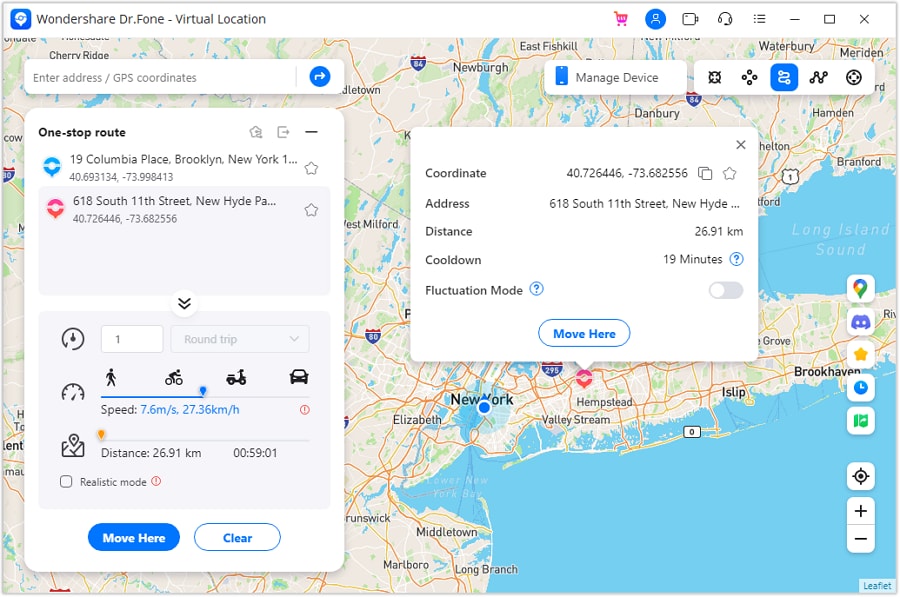
Step 2Define Simulation Parameters
Enter a number to define how many times you want to go back and forth, and select whether you want a Round trip or a Loop trip. Drag the slider on the speed option to set how fast you want to walk. Proceed to click Move Here on the bottom to start the movement simulation.
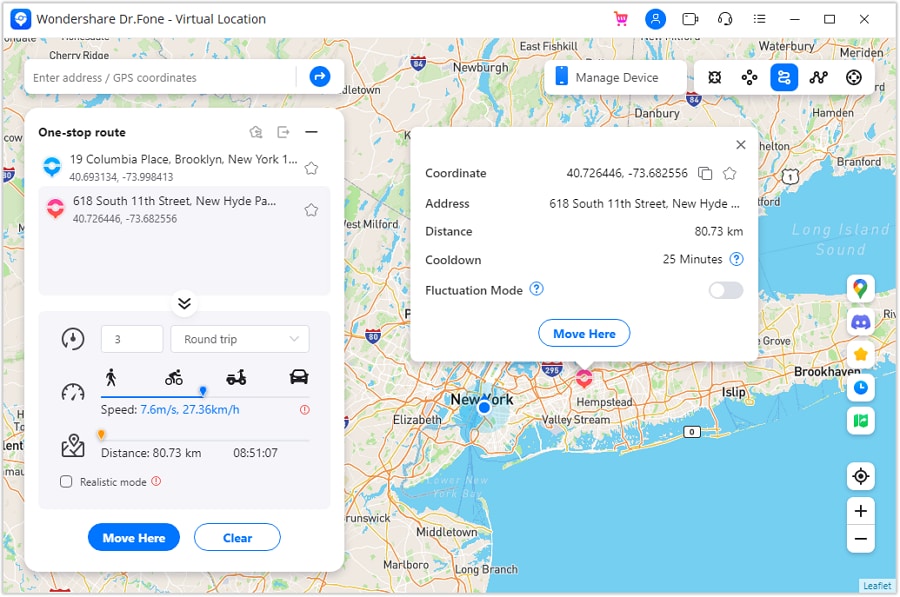
Step 3Start Simulation Movement
The respective simulation starts, and you can see your position is moving on the map with the speed you set. If you wish to hold the simulation, click Pause or tap Clear to revert to your original state.
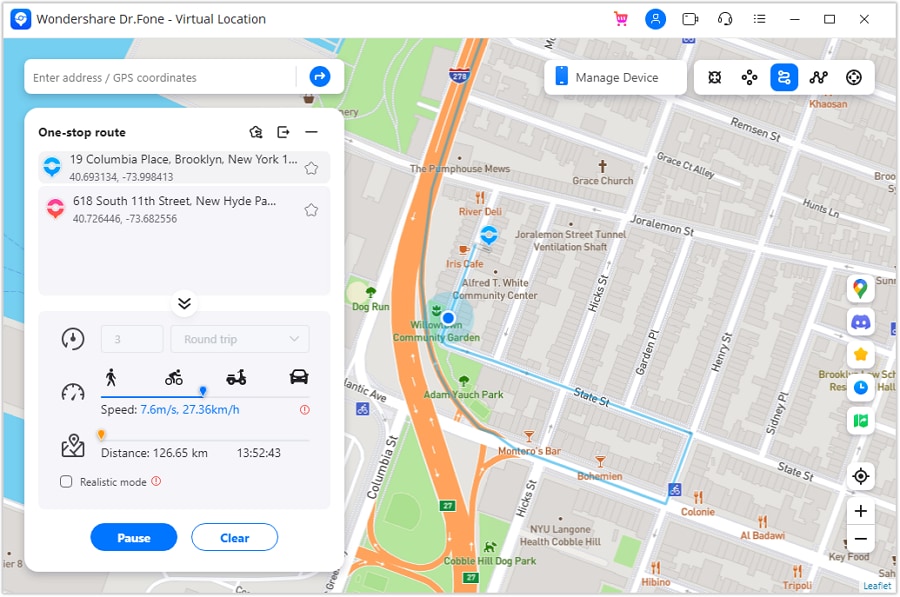
Part 2: Simulate Movement Along a Route (Multi-Stop Route)
You can try the multi-stop mode if you want to pass by multiple places along a route on the map. Learn how it is done when you are trying to **spoof location on Android/**iOS:
Step 1Start Multi-Stop Route and Set Parameters
Activate the Multi-Stop Route mode from the top-right section next to the One-Stop Route mode. After activating the mode, set multiple spots on the map by clicking your required place. Define the number of trips and speed. Click Start Moving to initiate the process.
Note: Select the spots along a specific road to prevent the game developer from thinking you are cheating.
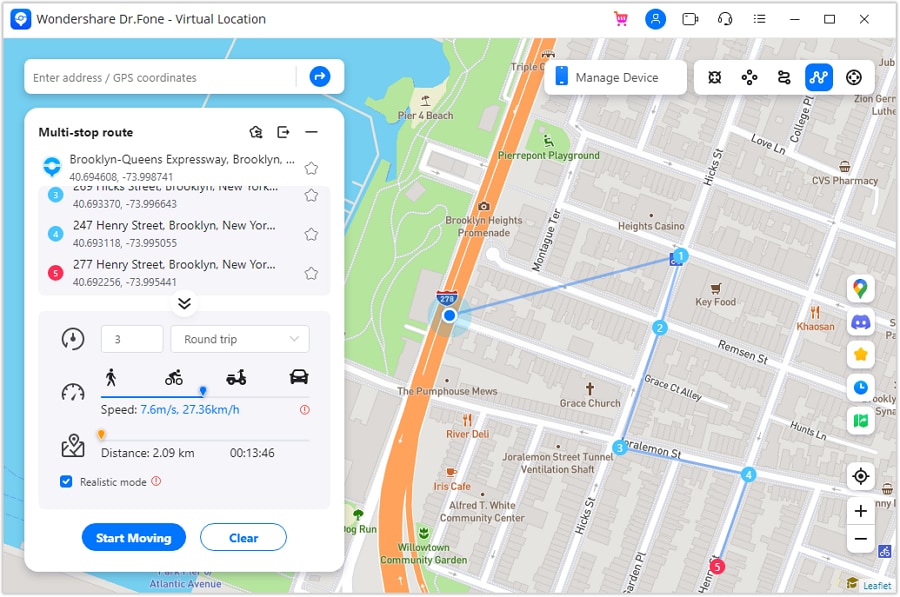
Step 2View Multi-Stop Route Movement
As the simulation starts, click Pause at any instance where you want to stop the simulation. You can also Clear all settings if required.
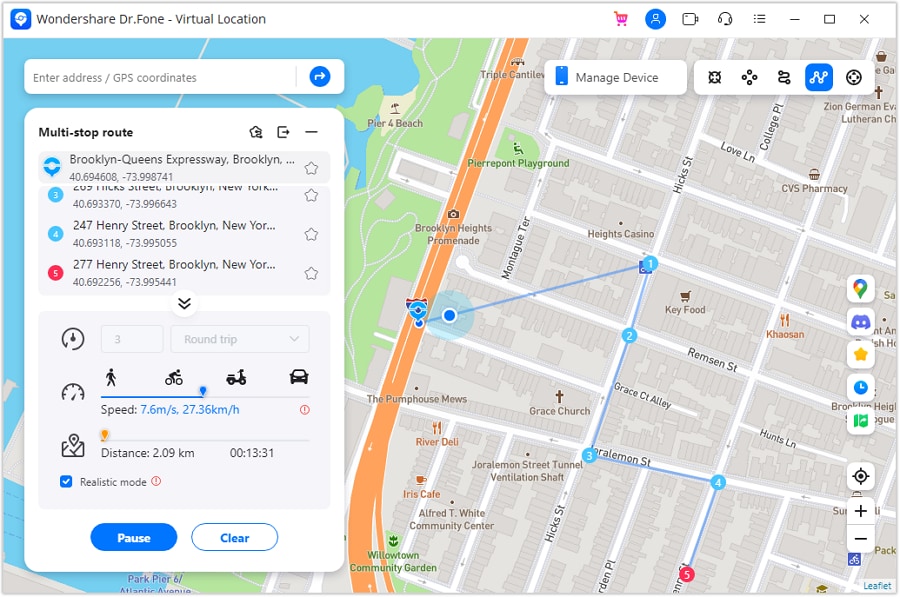
Part 3: Use Joystick for More Flexible GPS Control (Joystick Movement)
Dr.Fone has integrated the joystick feature into the Virtual Location program to spare 90% of the labor for GPS control. You can always find the joystick on the lower left part in teleport mode. And you can also click the joystick button in the upper right (the 5th one) to use the joystick feature.
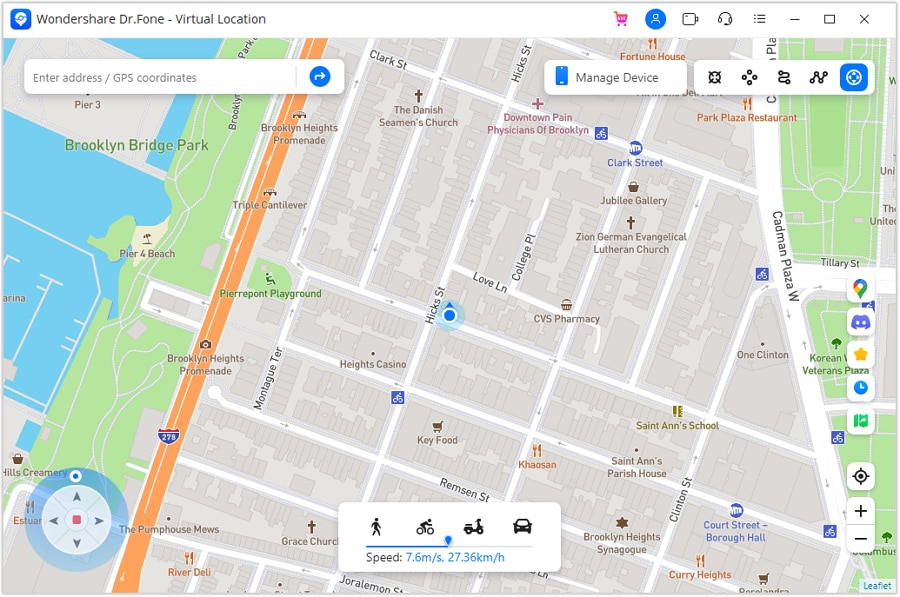
The joystick, like one-stop route or multi-stop route modes, aims to facilitate GPS movement on the map. But what’s better? The joystick lets you move on the map by changing directions in real time. Here are the two main scenes where you will definitely love the joystick.
- Automatic GPS movement: Click the Start button in the middle, and the automatic movement starts. Then just change the directions as you like by 1) clicking the left or right arrows, 2) dragging the spot around the circle, 3) pressing keys A and D on the keyboard, or 4) pressing keys Left and Right on the keyboard.
- Manual GPS movement: Move forward by constantly clicking the Up arrow in the program and long-pressing the key W or Up on the keyboard. Reverse by constantly clicking the Down arrow, or long-pressing the key S or Down on the keyboard. You can also tweak the directions using the four ways above before moving forward or reverse.
- Title: The Best 8 VPN Hardware Devices Reviewed On Oppo Find X6 Pro | Dr.fone
- Author: Ava
- Created at : 2024-08-01 21:10:47
- Updated at : 2024-08-02 21:10:47
- Link: https://fake-location.techidaily.com/the-best-8-vpn-hardware-devices-reviewed-on-oppo-find-x6-pro-drfone-by-drfone-virtual-android/
- License: This work is licensed under CC BY-NC-SA 4.0.




 Epubor Audible Converter for Mac: Download and convert Audible AAXC/AA/AAX to MP3 with 100% original quality preserved.
Epubor Audible Converter for Mac: Download and convert Audible AAXC/AA/AAX to MP3 with 100% original quality preserved.

 The BootIt Collection covers multi-booting, partitioning, and disk imaging on traditional PC’s using the standard BIOS and newer PC’s using UEFI. The collection includes BootIt Bare Metal (BIBM) for standard BIOS systems and BootIt UEFI (BIU) for UEFI system.
The BootIt Collection covers multi-booting, partitioning, and disk imaging on traditional PC’s using the standard BIOS and newer PC’s using UEFI. The collection includes BootIt Bare Metal (BIBM) for standard BIOS systems and BootIt UEFI (BIU) for UEFI system.
 OtsAV TV Webcaster
OtsAV TV Webcaster

 PDF application, powered by AI-based OCR, for unified workflows with both digital and scanned documents.
PDF application, powered by AI-based OCR, for unified workflows with both digital and scanned documents. 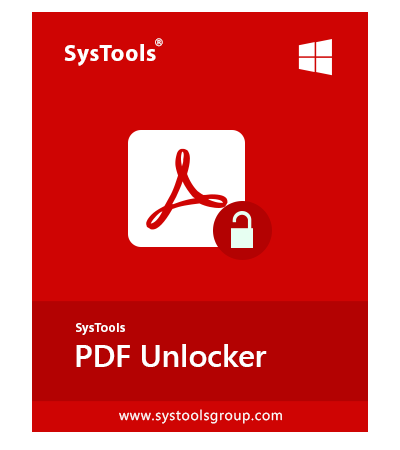
 vMix Pro - Software based live production. vMix Pro includes everything in vMix 4K plus 8 channels of Replay and 8 vMix Call
vMix Pro - Software based live production. vMix Pro includes everything in vMix 4K plus 8 channels of Replay and 8 vMix Call Jutoh is an ebook creator for Epub, Kindle and more. It’s fast, runs on Windows, Mac, and Linux, comes with a cover design editor, and allows book variations to be created with alternate text, style sheets and cover designs.
Jutoh is an ebook creator for Epub, Kindle and more. It’s fast, runs on Windows, Mac, and Linux, comes with a cover design editor, and allows book variations to be created with alternate text, style sheets and cover designs.